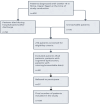Persistent Symptoms and Associated Risk Factors of COVID-19: A Cross-Sectional Study in Minia, Upper Egypt
- PMID: 40217997
- PMCID: PMC11988660
- DOI: 10.3390/healthcare13070699
Persistent Symptoms and Associated Risk Factors of COVID-19: A Cross-Sectional Study in Minia, Upper Egypt
Abstract
Background: A significant number of COVID-19 survivors around the world have been reporting persistent symptoms following their recovery. Long COVID is recognized as a condition affecting not only the respiratory but also the gastrointestinal, cardiovascular, neurological, immune, and hematopoietic systems. Objective: This study aimed to describe persistent symptoms in COVID-19 survivors six months post-infection in Minia, Upper Egypt, and investigate associated risk factors. Methods: This observational cross-sectional study included 189 hospitalized and non-hospitalized patients previously diagnosed with COVID-19. Demographic data, symptom severity, comorbidities, and persistent symptoms were collected. A logistic regression analysis was used to identify risk factors associated with long COVID, with statistical significance set at p < 0.05. Results: In total, 68.8% of participants were women, and 83.5% of patients reported at least one ongoing symptom. The most self-reported symptoms were fatigue (73.5%) and myalgia (45.5%), followed by dyspnea (43.3%). Age was associated with an increased risk of developing long COVID (OR 1.028, 95% CI 1.003-1.054, p = 0.030). Patients who were hospitalized during the acute phase had more than twice the risks of having persistent symptoms (OR 2.384, 95% CI 1.055-5.387, p = 0.037). Conclusions: A substantial proportion of COVID-19 survivors in Minia, Upper Egypt, continues to experience persistent symptoms, primarily constitutional and neurological manifestations. Many patients reported self-medicating with unprescribed antibiotics, highlighting a need for public awareness regarding viral infections and the risks associated with improper antibiotic use.
Keywords: cross-sectional study; long COVID-19 symptoms; risk factors; self-medication.
Conflict of interest statement
The authors have no conflicts of interest to declare.
Figures
Similar articles
-
Long COVID: rheumatologic/musculoskeletal symptoms in hospitalized COVID-19 survivors at 3 and 6 months.Clin Rheumatol. 2022 Jan;41(1):289-296. doi: 10.1007/s10067-021-05942-x. Epub 2021 Oct 29. Clin Rheumatol. 2022. PMID: 34713356 Free PMC article.
-
Assessment of the Frequency and Variety of Persistent Symptoms Among Patients With COVID-19: A Systematic Review.JAMA Netw Open. 2021 May 3;4(5):e2111417. doi: 10.1001/jamanetworkopen.2021.11417. JAMA Netw Open. 2021. PMID: 34037731 Free PMC article.
-
Persistent symptoms and clinical findings in adults with post-acute sequelae of COVID-19/post-COVID-19 syndrome in the second year after acute infection: A population-based, nested case-control study.PLoS Med. 2025 Jan 23;22(1):e1004511. doi: 10.1371/journal.pmed.1004511. eCollection 2025 Jan. PLoS Med. 2025. PMID: 39847575 Free PMC article.
-
'Long COVID': persistent COVID-19 symptoms in survivors managed in Lagos State, Nigeria.BMC Infect Dis. 2021 Mar 25;21(1):304. doi: 10.1186/s12879-020-05716-x. BMC Infect Dis. 2021. PMID: 33765941 Free PMC article.
-
Post-acute COVID-19 symptom risk in hospitalized and non-hospitalized COVID-19 survivors: A systematic review and meta-analysis.Front Public Health. 2023 Feb 16;11:1112383. doi: 10.3389/fpubh.2023.1112383. eCollection 2023. Front Public Health. 2023. PMID: 36875356 Free PMC article.
References
-
- Lippi G., Sanchis-Gomar F. Mortality of Post-COVID-19 Condition: 2025 Update. COVID. 2025;5:11. doi: 10.3390/covid5010011. - DOI
-
- Lashgari Kalat H., Sorouri S., Mirzaei M., Dehghani N., Dadshahi S. Psychological Disorders and Quality of Life among Medical Residents before, during and after the COVID-19 Pandemic: A Systematic Review. Med. Educ. Bull. 2024;5:863–877.
LinkOut - more resources
Full Text Sources


